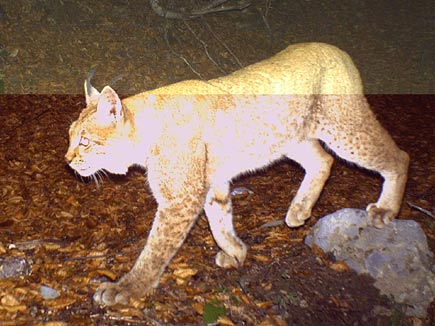Good news from Albania: With a camera trap EuroNatur's partner organization PPNEA successfully shot a picture of a Balkan Lynx in the Albanian national park Shebenik-Jablanica last Friday.

Smile please! For the second time a Balkan Lynx was photographed in Shebenik-Jablanica National Park.
© PPNEA/SCOPES, SNFThe first Balkan Lynx in this region was captured by a camera trap this summer, giving evidence that the Albanian part of the Jablanica-Shebenik Mountain Range is also the territory of this endangered big cat. In April 2010 the first photographic proof of the Balkan Lynx was obtained in the adjacent Macedonian Jablanica Mountains.
The second picture, taken by the photo trap in Shebenik-Jablanica National Park, is further important proof of the presence of lynxes in the Albanian-Macedonian border area. Furthermore, the long-term studies in this region also show, that only very few of these rare cats still live here. "Therefore we have to press ahead intensively with our conservation efforts", states EuroNatur's managing director Gabriel Schwaderer. Together with its partners, EuroNatur campaigns for the acknowledgement of wide parts of the Jablanica-Shebenik Mountains as a cross-border sanctuary and combats poaching.
More on EuroNatur-projects to protect the Balkan Lynx


